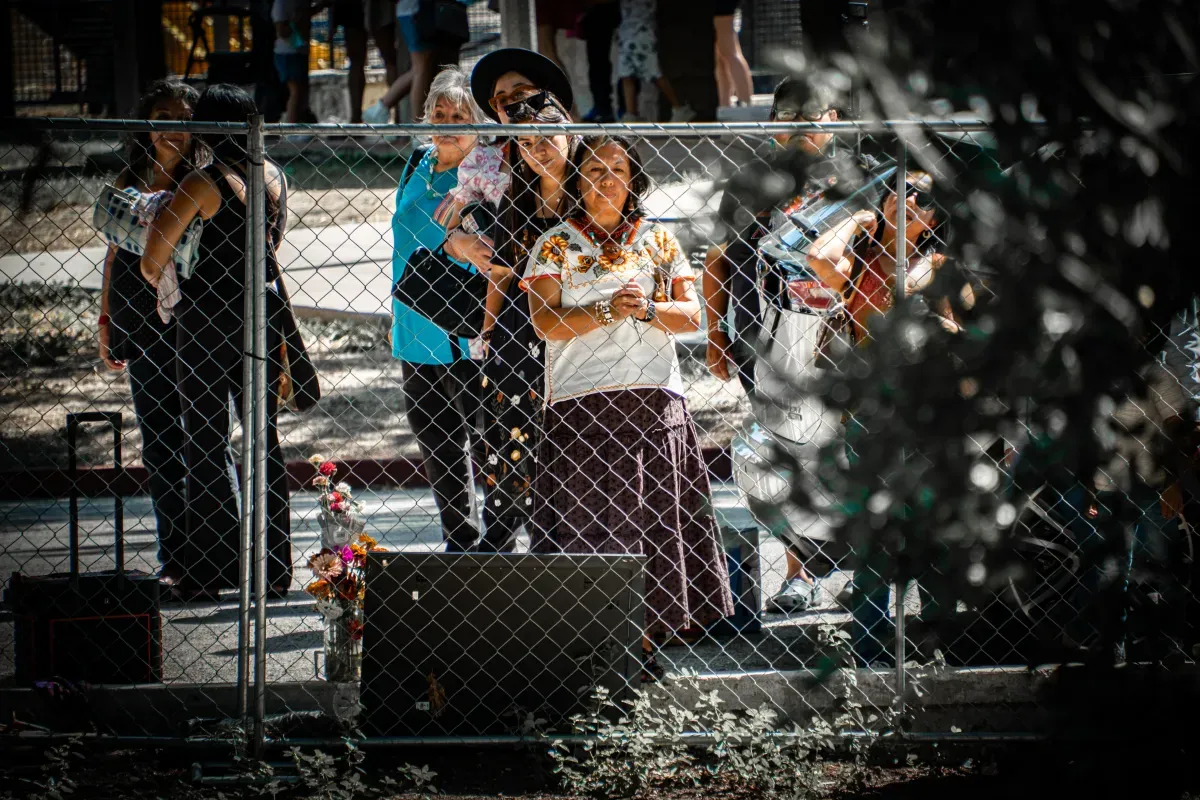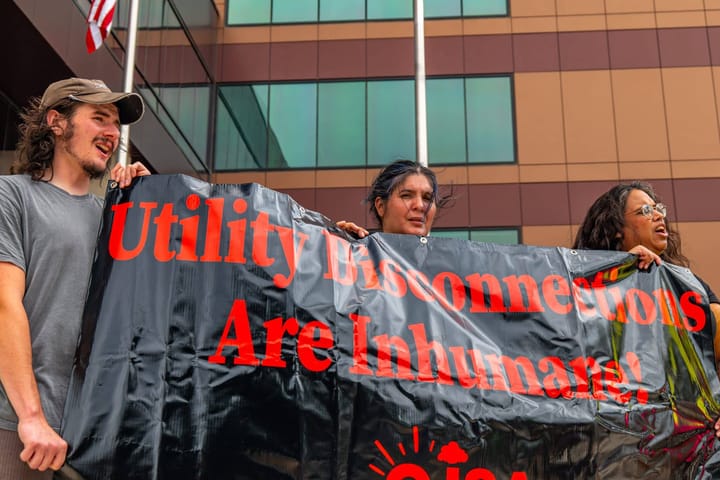A Resolution For San Antonio To Stop Displacing Birds, Trees, and Parkgoers

A full version of this article originally appeared on Deceleration
A resolution passed last month at LULAC’s state convention highlights the attacks on the birds and trees in Brackenridge Park —and their connection to civil and ceremonial rights for local Indigenous and Latine communities.
The City of San Antonio must end its policy of harassing migratory birds at Brackenridge Park and across the City’s parks system, according to Texas-based members of the League of United Latin American Citizens, or LULAC. The resolution challenging years of City policy chasing normally federally protected wildlife passed at the 95th annual Texas State Convention held last month in Odessa, Texas, during the development of policy priorities for the nation’s oldest civil rights organization for Latines and Chicanes.
San Antonio-based LULAC delegates announced today passage of the resolution supporting the preservation of migratory birds and heritage trees at Brackenridge Park, as well as the right of Indigenous and Latine communities to access one of San Antonio’s most beloved public parks for historic, ceremonial, and cultural purposes.
“I’m happy we submitted this resolution at the local and at the state level, and that it passed. Because we know the importance [the issue] has especially for our Latinos here in San Antonio,” said Claudia Sánchez, a member of San Antonio’s local LULAC delegation who has also participated in organizing around the City’s climate action plan.
“We feel there could be ways we could solve that problem without tearing them down, without removing the birds and removing their nests, because they’re native there,” Sánchez said. “But we’re seeing they haven’t really been working with the community to find a solution without tearing them down completely.”
The expulsion of migratory birds that have historically nested in San Antonio’s public parks is key not only to redevelopment interests at Brackenridge, embodied in the quasi-private Brackenridge Park Conservancy, but to Parks policy more broadly. Since 2019, the City of San Antonio has worked with state and federal wildlife management agencies to escalate a campaign of forced bird evictions, most notably by “radically altering” the habitat at Bird Island at Elmendorf Lake Park and in Brackenridge Park.
The City is armed with a federal permit to harass and kill, if deemed necessary, birds across the parks system that are normally protected by the international Migratory Bird Treaty Act. Targeted species in the City’s permit include the cormorant and snowy and cattle egrets and allow for a range of tools, including auditory, pyrotechnic, and chemical harassment. Snowy egrets are listed as a Species of Greatest Conservation Need in Texas, as are other birds that have been seen targeted by City efforts and are known to cohabit in or adjacent to egret rookeries, including the Tricolored, Little Blue, and Green herons.
The former president of the local Audubon Society warned against City attacks on the birds in 2019 when the City was arguing the birds posed a hazard to US Air Force pilots at Kelly Field:
“You cannot disturb that [cattle] egret species without disturbing the fish eating egrets it likes to nest with—the Great White Egret and the Snowy Egrets. The Great White Egret that graces our shores of San Antonio happens to be THE logo bird of National Audubon Society. As you know, when you start trying to mess with Nature, often unforeseen consequences can occur.”
Data supplied by the city at the time alluded to four bird strikes that occurred at the airstrip that involved cattle egrets—out of roughly 50 strikes per year, over a period of roughly nine years.
Recent research has spotlighted the remarkable decline of bird populations across North America: 30 percent of the total bird population since 1970—a staggering three billion birds.
However, the current local Audubon leadership has been much more accommodating to City efforts, even helping to lift off a research effort that not only doesn’t oppose the City’s efforts but seeks to see the birds relocated due to their impact on local water quality to parks south of San Antonio with paid-only access, including Calaveras Lake Park or the Mitchell Lake Audubon Center.
The original bond-funded Brackenridge redevelopment project language and email communications unearthed by Deceleration via public records requests of City staff and state agencies showed the linkages between efforts to displace migratory birds at Brackenridge and plans at the time to remove more than 100 trees in the headwaters area of Brackenridge Park.
LULAC’s resolution points to the way in which rights for the birds, and the trees in which they nest, is inextricable from rights to public and ceremonial space for Indigenous, Latine, and disabled communities. In 2023, two members of the Lipan-Apache “Hoosh Chetzel” Native American Church sued the City of San Antonio for violating the right of local Indigenous communities to access areas of the park of ceremonial significance. While modest gains were achieved via the lawsuit, allowing access for a limited number of attendees, U.S. District Judge Fred Biery denied the bulk of the group’s claims.
LULAC points further to the ways COSA’s campaign of harassment also creates displacement pressure for those largely working class Latine families who have historically camped out in Brackenridge on Easter weekend: “During the Easter holiday weekend [of] 2024, the unsafe level of noise continued all weekend long starting at 6 AM on Good Friday, March 29, 2024. Contractors banged boards and shot pyrotechnic explosives in a reckless and unsafe manner over Easter campers. Families camping overnight, including adults and children with health conditions falling under ADA, complained of adverse effects caused by the noise. COSA’s Disability office dismissed complaints without investigation. At a recent public meeting, Assistant City Manager, Lori Houston informed residents that ‘the COSA is not going to stop.’”
Notably, “[c]ontractors only ceased making the unsafe noise for groups practicing yoga at the park, an event hosted by the BPC and District 1 Councilperson.”
LULAC’s support, then, recognizes that protection of birds and trees is a civil rights issue for both Indigenous and Latine communities and vice versa: Indigenous and Latine civil rights issues are also necessarily matters of environmental protection.
Despite LULAC’s problematic early history of advocating civil rights for Chicanes in the Southwest by reclassifying them in the US Census as “white” rather than “Mexican”—erasing the actual racialization of those whom the border crossed in 1848, including campaigns of state-sanctioned genocidal violence in the US/Mexico borderlands—it’s telling that that LULAC’s top policy priority in 2024 is “foundations of health and wellbeing,” with climate and environmental justice at the top of the list.
Sánchez underscored these connections. “We’ve been working on every issue that impacts our Latino community since [1929]. So obviously everything from politics to housing, civil rights, voting,” she said. “More than ever we’re focusing on the environment, because it impacts everyone—[so] obviously the Latino community … whether it’s more contamination or that’s where our community lives.”
“But here in San Antonio with Brackenridge Park, we have a park that is very symbolic to our Latino community, that’s where people go and celebrate the quinceañeras or birthday parties, and then especially the Native, Indigenous communities, that’s where they have their ceremonies,” Sánchez said. “But it also impacts us as a whole, with birds and trees obviously [part of the] living environment for the Latino community. It impacts us [in] so many ways.”
This intersectional thinking about both environmental and civil rights issues is reflected in the key demands named in Texas LULAC’s adopted resolution:
“LULAC demands that the bird population be allowed to return, nest and be protected from future attacks on its existence, and its livelihood at Brackenridge Park and other COSA Parks.
LULAC demands that the Indigenous community must continue to gather at Brackenridge Park for prayer and sacred ceremonies without any infringement due to the changes made to the park.
LULAC demands that the Latino community must be able to gather at Brackenridge Park for any celebration or exercise such as celebrating Easter, birthdays, graduations, weddings, etc. without attacks, harassment, infringement due to excessive noise levels or changes made to the park.
LULAC will monitor and work with the parties to ensure preference to the conservation of the trees, birds, and rights to gather of ALL citizens at Brackenridge Park and ALL the City of San Antonio Parks.”
The Brackenridge Park Conservancy and Office of the San Antonio City Manager hosted a couple community meetings in January, seeking a “reset” on local relationships without making any change in development plans at the park or efforts to evict the migratory birds.
"Deceleration is a nonprofit environmental justice newsroom based in San Antonio, Texas. Sign up for their weekly newsletter here



Comments ()